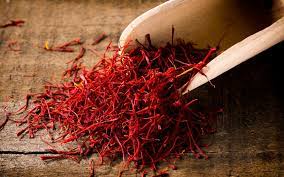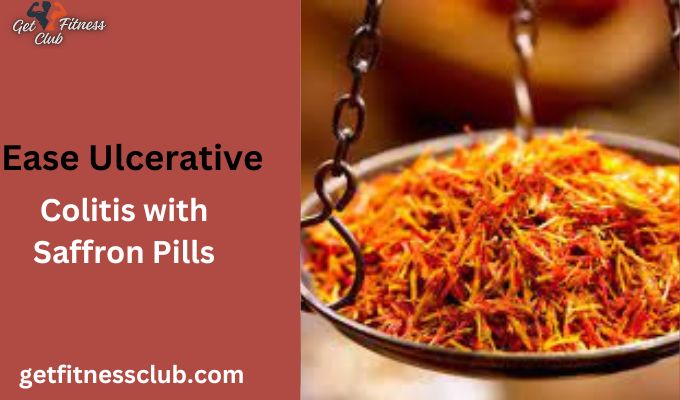Are you or someone you know Ease Ulcerative Colitis with Saffron Pills? Imagine finding relief in something as simple as saffron supplements. Yes, you heard it right! In ulcerative colitis, saffron supplements may reduce inflammation. This golden spice, renowned for its culinary uses, holds a promising secret in combating the inflammation associated with this condition. In this article, we’ll delve into the potential benefits of incorporating saffron into your daily routine and how it could be a game-changer in managing the symptoms of ulcerative colitis. Let’s unlock the power of this natural remedy together.

What is saffron?
A spice known as saffron is derived from the flower of Crocus sativus, also known as saffron crocus. It is prized for its distinct aroma, flavor, and vibrant color, making it a popular ingredient in various cuisines worldwide.
Saffron reduces inflammation in IBD:
Research suggests that saffron exhibits anti-inflammatory properties, which can be beneficial in inflammatory bowel diseases (IBD) such as ulcerative colitis. Studies have shown that saffron supplementation may help reduce inflammation in the gut, providing relief to individuals suffering from ulcerative colitis.
How does saffron help IBD?
Saffron contains compounds such as crocin and crocetin, which have been found to possess anti-inflammatory and antioxidant effects. These compounds may help modulate the immune response in the gut, thereby reducing inflammation and alleviating symptoms associated with ulcerative colitis.
Other medicinal herbs that help ulcerative colitis:
In addition to saffron, several other medicinal herbs have been studied for their potential benefits in managing ulcerative colitis. Examples include turmeric, ginger, aloe vera, and Boswellia serrata. These herbs may offer complementary effects in reducing inflammation and improving gut health.
Larger studies are needed to confirm saffron’s benefits:
While initial research on saffron’s potential in treating ulcerative colitis is promising, larger clinical trials are needed to validate its efficacy and safety. More extensive studies will help establish saffron as a viable treatment option for individuals with ulcerative colitis.

Latest news:
Stay updated on the latest developments in saffron research and its role in managing ulcerative colitis. Follow reputable sources and scientific journals for the most recent findings and advancements in this field.
Enhancing Gut Health with Saffron:
As research into the therapeutic effects of saffron continues to evolve, there is growing interest in exploring its potential role in enhancing gut health. Future studies may focus on understanding the mechanisms by which saffron exerts its beneficial effects on the gut microbiota and intestinal inflammation. By elucidating these mechanisms, researchers can develop targeted interventions utilizing saffron to promote gut health and alleviate symptoms of gastrointestinal disorders.
Future Directions in Saffron Research and Development:
The future of saffron research holds promise for uncovering new therapeutic applications and optimizing its use in managing various health conditions, including ulcerative colitis. Continued efforts in preclinical and clinical studies will help elucidate the full potential of saffron as a natural remedy for inflammation and gut disorders. Collaborative research endeavors involving scientists, healthcare professionals, and industry partners will drive innovation in saffron research and pave the way for the development of effective therapeutic interventions.
Conclusion:
In conclusion, saffron supplements may offer a natural and effective approach to lowering inflammation in ulcerative colitis. With its anti-inflammatory and antioxidant properties, saffron shows promise in managing symptoms and improving the quality of life for individuals with this chronic inflammatory condition. However, further research is needed to fully understand saffron’s mechanisms of action and establish its efficacy in clinical settings. By staying informed and engaging with the latest advancements in saffron research, individuals with ulcerative colitis can explore this golden remedy as a potential adjunct to their treatment regimen.

FAQS:
Q1: Does saffron reduce inflammation?
Saffron, containing crocin and safranal, may have anti-inflammatory effects. However, scientific evidence on its impact on inflammation in ulcerative colitis is currently limited.
Q2: What helps reduce inflammation when treating ulcerative colitis?
Treating ulcerative colitis involves medications like amino salicylates and corticosteroids, along with dietary changes, stress management, and exercise to help reduce inflammation and manage symptoms effectively.
Q3: What supplements should you avoid with ulcerative colitis?
Avoid high-fiber supplements, certain probiotics, and herbal supplements like slippery elm and aloe vera, as they may worsen symptoms or interact with medications used for ulcerative colitis.
Q4: What anti-inflammatories are good for ulcerative colitis?
Effective anti-inflammatories for ulcerative colitis include amino salicylates, corticosteroids, immunomodulators, and biologics. Consult a healthcare professional to determine the best treatment based on disease severity and individual response.


